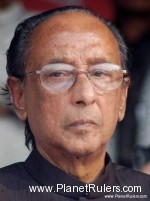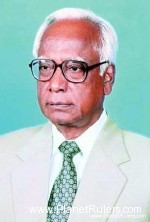Abdul Hamid, President of Bangladesh (re-elected on Feb 7, 2018)
 Abdul Hamid (born: 1 January 1944) is the 20th and current President of Bangladesh. Prior to this position he served as the Speaker of the National Parliament from 25 January 2009 – 24 April 2013. He was the acting President after the death of Zillur Rahman in March 2013.
Abdul Hamid (born: 1 January 1944) is the 20th and current President of Bangladesh. Prior to this position he served as the Speaker of the National Parliament from 25 January 2009 – 24 April 2013. He was the acting President after the death of Zillur Rahman in March 2013.
Hamid was born in Kamalpur village, Mithamain Upazila under Kishoreganj District to his parents – Hazi Md. Tayebuddin and Tomiza Khatun. Hamid passed I.A. and B.A. from Gurudayal Government College in Kishoreganj. He later earned his LLB degree from Central Law College under University of Dhaka. He then became a practicing lawyer in the Kishoreganj Judge Court. He was appointed the President of Kishoreganj Bar Association several times.
Political career
Hamid started his political career whilst a student in Kishoreganj, as the vice president of Gurudayal Government College. He was elected 7 times as a member of Parliament from 1970 to 2009.[3] He was the deputy speaker of the National Parliament of Bangladesh when Awami League formed the government in 1996. In 2001, he was appointed as the deputy leader of the opposition party at the National Assembly. On 25 January 2009, he became the Speaker of the National Parliament of Bangladesh.[citation needed] For his contribution to Bangladesh Liberation War in 1971, he was awarded Independence Day Award in 2013.
Presidency
Hamid was appointed acting President of Bangladesh on 14 March 2013 while President Zillur Rahman was in hospital in Singapore. Rahman died six days later. On 22 April 2013 Hamid was elected the President in an uncontested vote.
Personal life
Hamid is married and he has three sons and one daughter.
Source: Wikipedia
Zillur Rahman, President of the People’s Republic of Bangladesh (died on Mar 20, 2013)
Mr. Md. Zillur Rahman, the 19th President of the People’s Republic of Bangladesh, was born in a respectable Muslim family under Bhairab Thana of Kishoreganj district on March 09, 1929. His father late Meher Ali Mian was a renowned lawyer, the Chairman of the then Mymensingh Local Board and the Member of the District Board.
Mr. Zillur Rahman started his academic life at the district town of Mymensingh. He passed Matriculation from Bhairab K. B. High School in 1945 and obtained Intermediate of Arts (I. A.) certificate from Dhaka Intermediate College. In 1954, he got his M.A. with Honors in History and L. L. B. degree from the University of Dhaka.
Mr. Zillur Rahman played an active role in the great Language Movement in 1952. He presided over a student gathering held in the historic Amtala (Mango grove) of Dhaka University on 19 February 1952 on demand of Bangla as the State Language. The work plan of 21 February was taken from here. Mr. Zillur Rahman was one of the prominent leaders among the 11 student-leaders who met at the pond-side between Fazlul Huq Hall and Dhaka Hall on 20 February 1952 and took decision to break the section144.
In 1953, he was elected as the Vice-President of Student Union of Fazlul Huq Hall of Dhaka University uncontested. The University authority expelled him from the University and snatched his Masters Degree due to his active participation in Language Movement. However, facing intense mayhem by the students, the university authority compelled to return his degree. At the time of Jukto-Front (United Front) Election in 1954, he was made the Vice-Chairman of Election Steering Committee of the greater Mymenshing district. He also performed his duties as the President of erstwhile East Pakistan Awami Sechchhasebak League. He was the founder President of Kishorgonj Awami League in 1956. He was elected General-Secretary of Dhaka District Bar Association in sixties.
Mr. Zillur Rahman came in close touch with Bangabandhu Sheikh Mujibur Rahman during his study in Dhaka Intermediate College in 1946, when he was engaged in publicity work on referendum in Sylhet during the British regime. He took part in all mass-movements including the movement against military rule in 1962, six-point movement in 1966 and mass-upsurge in 1969 as a close associate of the Father of the Nation Sheikh Mujibur Rahman. In 1970, he was elected Member of the National Assembly (M. N. A.) of Pakistan.
Mr. Zillur Rahman was one of the veteran organizers of our Liberation War in 1971. He was associated with the operation of the Sadhin Bangla Betar Kendro (a Radio Centre of Independent Bangladesh) and publication of newspaper named, JoyBangla, the mouth-piece of the then Mujibnagar Government . During the war of liberation, the occupying Pakistan Government sentenced him twenty-year imprisonment and confiscated his all properties by canceling the Membership of the National Assembly.
In 1972, just after our victory in the war of liberation, he as a Member of Bangladesh Constituent Assembly actively took part in formation of the Constitution of Bangladesh. He was elected Member of Parliament (MP) in 1973 and 1986 from his constituency. In 1996, he re-elected as MP in the 7th Parliament and became a Minister. He held the portfolio of the Ministry of Local Government, Rural Development & Cooperatives. Besides, he successfully performed the duties of Deputy Leader in the Parliament till 2001. Mr. Zillur Rahman further elected MP in the 8th Parliament in 2001.
Mr. Zillur Rahman led the party in a very crucial time with courageous and farsighted after the arrest of Sheikh Hasina, the President of Bangladesh Awami League, on July 16 following the promulgation of State of Emergency on January 11, 2007. During her 11 month- captive life in Special Jail and six-month staying abroad for treatment, Mr. Zillur Rahman played vital role as the Acting President of the Party to keep the Party united and to revive the Democracy. Bangladesh Awami League won the landslide victory in the 9th Parliament Election held in 29 December 2008. He became the Member of Parliament for the Sixth time. He has been playing pivotal role as the Deputy Leader of the Parliament before taking oath as the 19th President of the Republic.
In 1972, after the Independence, the Father of the Nation Bangabandhu Sheikh Mujibur Rahman was elected as the President while Mr. Md. Zillur Rahman was elected as the General-Secretary of Bangladesh Awami League. He re-elected as the General-Secretary of the Party in 1974. He was the first General Secretary of Bangladesh Krishok Sramik Awami League in 1975. After the brutal assassination of the Father of the Nation Bangabandhu Sheikh Mujibur Rahman and his family in 1975, he was kept in prison for 4 years. In 1981, after the return of Sheikh Hasina, the elder daughter of Bangabandhu, from abroad to motherland, Mr. Zillur Rahman played important role as Presidium Member of Bangladesh Awami League. He was imprisoned again in 1986 while he was a Member of Parliament. He was elected as General-Secretary of Bangladesh Awami League both in 1992 and in 1997.
Mrs. Ivey Rahman, the beloved wife of the Hon’ble President Zillur Rahman and a veteran leader of Bangladesh Awami League died after two days following the brutal grenade attack on 21 August 2004 at a grand-rally of Bangladesh Awami League at Bangabandhu Avenue in Dhaka. She was the Ex-President of Bangladesh Mohila Awami League and Ex-Chairperson of Jatio Mohila Songstha. Until her death, she was the Secretary of Bangladesh Mohila Awami League. Mr. Zillur Rahman is blessed with a son and two daughters.
Mr. Md. Zillur Rahman sworn in of the office of the President of the People’s Republic of Bangladesh on 12 February 2009 as the 19th President.
LINK: http://www.bangladesh.gov.bd
Iajuddin Ahmed, Former President of Bangladesh
Iajuddin Ahmed (1931- ) President of Bangladesh (6 September 2002- ). Born at Nayagaon village of munshiganj on 1 February 1931, Iajuddin Ahmed passed matriculation from Munshiganj High School in 1948 and ISc in 1950 from Haraganga College, Munshiganj. He passed BSc in 1952 from the university of dhaka and in 1954, passed MSc in Soil Science from the same university. Then he left for higher studies in the USA and did MS in 1958 and PhD in 1962 both from Wisconsin University. Upon his return home after completion of higher studies Iajuddin Ahmed joined as an assistant professor in the Department of Soil Science, University of Dhaka.
Professor Ahmed served as the chairman, Department of Soil Science, University of Dhaka (1968-1969; 1976-1979), Provost, Salimullah Muslim Hall, University of Dhaka (1975-1983), Dean of the Faculty of Biological Sciences from 1989 to 1991, Chairman of the Public Service Commission (1991-1993), Chairman, University Grants Commission (1995-1999), and Vice Chancellor, State University of Bangladesh (2002). Professor Ahmed also worked as visiting professor in Cornell University (USA) in 1984 and the German Technical University and Gottingens University of Germany in 1984. He has authored 125 research articles.
Major areas of his research are the effects of salinity on paddy plants of the coastal areas and storage of plant food under the ground for their supply to plants according to needs. His invention of a new method of underground plant food storage drew attention of scholars at home and abroad. In recognition of his contribution to the development of education, Iajuddin Ahmed was awarded the Ekushey Padak in 1995. He also received the Ibrahim Memorial Medal in 1987-88, and Atish Dipankar Medal in 1990.
In 1991, Iajuddin Ahmed served as an Advisor to the Interim government and was in charge of the ministries of food and cultural affairs. Elected on 5 September 2002 as unopposed, Professor Iajuddin Ahmed took oath as the President of Bangladesh on 6 September 2002.



